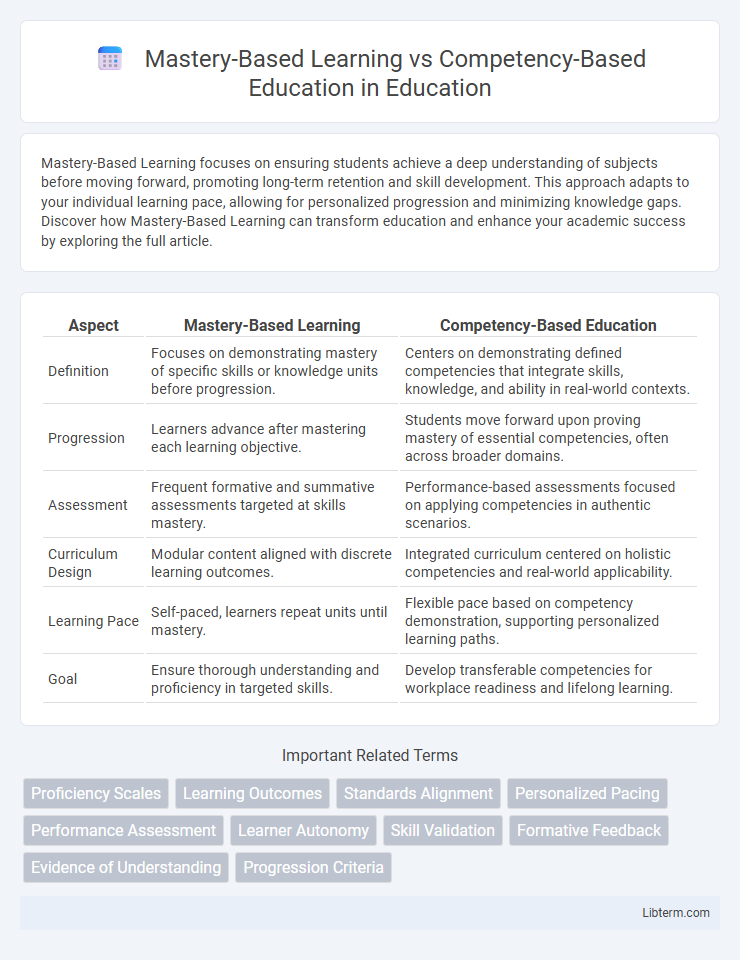Mastery-Based Learning focuses on ensuring students achieve a deep understanding of subjects before moving forward, promoting long-term retention and skill development. This approach adapts to your individual learning pace, allowing for personalized progression and minimizing knowledge gaps. Discover how Mastery-Based Learning can transform education and enhance your academic success by exploring the full article.
Table of Comparison
| Aspect | Mastery-Based Learning | Competency-Based Education |
|---|---|---|
| Definition | Focuses on demonstrating mastery of specific skills or knowledge units before progression. | Centers on demonstrating defined competencies that integrate skills, knowledge, and ability in real-world contexts. |
| Progression | Learners advance after mastering each learning objective. | Students move forward upon proving mastery of essential competencies, often across broader domains. |
| Assessment | Frequent formative and summative assessments targeted at skills mastery. | Performance-based assessments focused on applying competencies in authentic scenarios. |
| Curriculum Design | Modular content aligned with discrete learning outcomes. | Integrated curriculum centered on holistic competencies and real-world applicability. |
| Learning Pace | Self-paced, learners repeat units until mastery. | Flexible pace based on competency demonstration, supporting personalized learning paths. |
| Goal | Ensure thorough understanding and proficiency in targeted skills. | Develop transferable competencies for workplace readiness and lifelong learning. |
Introduction to Mastery-Based Learning and Competency-Based Education
Mastery-Based Learning emphasizes students progressing upon demonstrating thorough understanding of specific skills or knowledge, ensuring personalized pacing and deep comprehension. Competency-Based Education structures curriculum around acquiring defined competencies that align with real-world skills, focusing on measurable outcomes and practical application. Both approaches prioritize learner-centered education but differ in assessment methods and flexibility of progression.
Defining Mastery-Based Learning
Mastery-Based Learning emphasizes student progression only after demonstrating a deep understanding of specific skills or content, ensuring personalized pacing and complete comprehension. The approach uses formative assessments to identify gaps and reinforce knowledge until mastery is achieved, promoting long-term retention and application. Unlike traditional grading, it prioritizes mastery levels over time spent, tailoring instruction to individual learning needs.
Defining Competency-Based Education
Competency-Based Education (CBE) defines learning through demonstrated mastery of specific skills and knowledge, allowing students to progress at their own pace once competencies are met. Unlike traditional time-based models, CBE emphasizes clear, measurable learning outcomes aligned with real-world applications and workforce demands. This approach ensures personalized education paths, fostering deeper engagement and practical expertise in learners.
Key Principles Behind Each Approach
Mastery-Based Learning emphasizes personalized pacing, ensuring students achieve a deep understanding of specific skills or content before progressing. Competency-Based Education focuses on demonstrating measurable skills and knowledge aligned with defined competencies that prepare learners for real-world applications. Both approaches prioritize student-centered outcomes but differ in structure; mastery-based learning tailors the depth of understanding, while competency-based education centers on achieving explicit performance standards.
Assessment Methods: Mastery vs Competency
Assessment methods in mastery-based learning emphasize students demonstrating thorough understanding and proficiency in specific skills before progression, using formative assessments and frequent feedback to ensure mastery of content. Competency-based education assessments focus on evaluating students' ability to apply knowledge in real-world scenarios, measuring performance against defined competencies through practical tasks and portfolios. Both approaches prioritize personalized learning paths but differ in assessment focus--mastery-based learning targets knowledge acquisition, while competency-based education stresses skill application and real-life readiness.
Personalization and Student-Centered Learning
Mastery-Based Learning emphasizes personalized pacing, allowing students to advance upon demonstrating thorough understanding of specific standards, fostering deeper engagement and retention. Competency-Based Education centers on clearly defined skills and knowledge, enabling tailored instruction that meets individual learner needs and promotes self-directed progress. Both approaches prioritize student-centered learning by adapting to each student's strengths and challenges, enhancing motivation and academic success.
Role of Teachers and Facilitators
Teachers in mastery-based learning act as personalized coaches, guiding students through individualized progress until achieving complete understanding, while facilitators in competency-based education focus on ensuring learners meet predefined skill thresholds for real-world application. Mastery-based learning emphasizes continuous feedback and tailored instruction, enabling teachers to adapt strategies for each student's pace and depth of comprehension. Competency-based facilitators prioritize assessment and verification of essential competencies, supporting learners in demonstrating practical abilities aligned with professional standards.
Advantages of Mastery-Based Learning
Mastery-Based Learning allows students to progress at their own pace until they achieve a deep understanding of the subject matter, ensuring that foundational skills are solid before advancing. This approach promotes personalized learning experiences and reduces achievement gaps by focusing on individual student mastery rather than time spent in class. Research shows that Mastery-Based Learning improves retention and critical thinking by emphasizing mastery over rote memorization.
Benefits of Competency-Based Education
Competency-Based Education (CBE) offers personalized learning pathways that allow students to progress upon demonstrating mastery, ensuring a deeper understanding of skills and knowledge. This approach increases flexibility, enabling learners to balance education with work or personal responsibilities while accelerating their academic progress. CBE also improves outcomes by aligning assessments directly with industry standards, enhancing employability and real-world readiness.
Choosing the Right Approach for Your Educational Goals
Mastery-Based Learning emphasizes students achieving a high level of understanding in each subject area before progressing, ideal for personalized pacing and deep knowledge retention. Competency-Based Education focuses on demonstrating specific skills and competencies, aligning well with career readiness and measurable outcomes. Selecting the right approach depends on your educational goals, whether fostering in-depth mastery or ensuring practical skill application and workforce alignment.
Mastery-Based Learning Infographic

 libterm.com
libterm.com